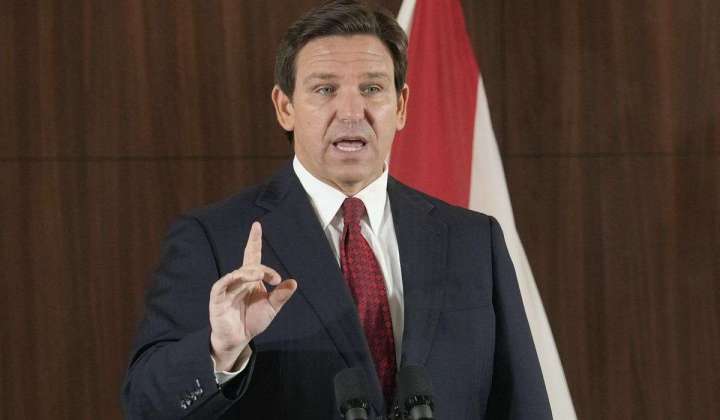DeSantis’ bid to root out sexually explicit content in schools attacked as book-banning scheme

JACKSONVILLE, Fla. — Florida public schools have begun to implement a new state law to weed out sexually explicit content and other inappropriate material from classroom bookshelves, triggering accusations from the left that Gov. Ron DeSantis is banning books and threatening to jail teachers for stocking their bookshelves.
Mr. DeSantis, a Republican eyed as a potential 2024 presidential candidate, signed legislation that required schools to give parents access to an inventory of books made available in public schools. The schools are now beginning to implement the new law.
Specially trained school officials must review every book they make available to students to ensure none of the material is considered pornography or is deemed otherwise inappropriate under state education laws. And school districts must annually report to the state any books parents have challenged as inappropriate.
The new law responds to demands from parents for greater transparency about what kinds of books their children can access in school and follows complaints from parents rights groups who learned some of the books available in Florida’s public schools were sexually explicit and, they believe, inappropriate.
The offending titles included “Gender Queer,” a book found in some Florida high schools that includes graphic depictions of the author’s sexual experiences, and a book on the 1969 Stonewall riots made available in some elementary school libraries that describes men having orgies, rampant use of drugs and alcohol and the rationalization of prostitution. Another book found in some Florida middle schools, “The Perks of Being a Wallflower,” includes multiple references to drugs, alcohol, abuse and sex.
“Some of the stuff that has ended up in schools is incredibly, incredibly disturbing stuff,” Mr. DeSantis said when he signed the law. “You are talking about kids in middle school.”
The new law, Mr. DeSantis said, gives parents “the right to know what is being taught in our schools.”
Alicia Farrant, a mother of five who was elected to the Orange County School Board in November, said she obtained a copy of “This Book is Gay,” from Boone High School in Orlando so she could examine the contents.
“That book, in particular, described how to have sex — girl on girl, girl-boy, boy-girl, boy-boy — and then how to navigate all of the different devices that you can use, like how to log into [the sex hookup app] Grindr,” Ms. Farrant said.
Many parents don’t realize how explicit some of the books found in Florida’s public schools have become, she said.
“The standard was just kind of thrown out the door,” Ms. Farrant said. “And no one was really checking and making sure that the books that were coming in were appropriate for a school setting.”
But now that Florida’s 73 school districts have begun to implement the new law, photos and videos of empty bookshelves in schools have circulated on social media by opponents who say it is forcing public school teachers to drastically restrict access to reading out of fear their choices are not in compliance with the law.
“Florida school teachers and librarians are removing all books from libraries and classrooms to avoid criminal prosecution by DeSantis,” tweeted Daniel Uhlfelder, a Democrat and staunch DeSantis critic who ran unsuccessfully for Florida attorney general in 2022. He also posted a video of empty library bookshelves in Duval County, Florida.
Critics of the new law point to a new state training manual from the Florida Department of Education that warns knowingly distributing harmful material to minors, including some representations of nudity or sexual content, is a third-degree felony.
Under Florida law, books must be “free of pornography and material prohibited under state statute, suited to student needs and their ability to comprehend the material presented, appropriate for the grade level and age group for which the materials are used and made available.”
In Duval County, a Jacksonville-area district that serves 127,000 students, the school system’s chief academic officer recently told teachers that books “not on the district-approved list, or not approved by certificated media specialists, need to be covered or stored and paused for student use.”
Chief Academic Officer Paula Renfro said the review of books in Duval County has been “a huge undertaking,” since the start of the school year and it has temporarily reduced access to some books.
Teachers unions quickly criticized Mr. DeSantis, who recently prohibited public high schools in the state from implementing an Advanced Placement course in African American studies because it included “queer theory.”
Mr. DeSantis, appearing in Jacksonville last week, questioned what queer theory had to do with African American studies and said the AP course “was pushing an agenda on our kids.” The AP is now revising the material.
Bryan Griffin, a spokesman for the governor, rejected claims that the state is dictating the content of school libraries.
“There is no statewide ban on books, nor has the state prohibited any specific book,” Mr. Griffin said. “But school districts are each obligated to make a determination as to whether something has enough educational value to be offered in school or not, and that all materials provided in school comply with Florida law.”
Becky Nathanson, a member of Moms for Liberty in Duval County, which advocates for parents rights in education, said the pictures and videos of empty bookshelves in Jacksonville Schools may be “political theater” aimed at Mr. DeSantis, who last week appeared in Jacksonville to announce a new bill banning teachers unions from deducting dues from teacher paychecks.
“Whether it’s the teachers union or other individuals or groups that just have such opposition to the governor that they’re making this into a much more dramatic disruption than it needs to be,” Mrs. Nathanson said. “The state has not required classroom libraries to be shut down.”






